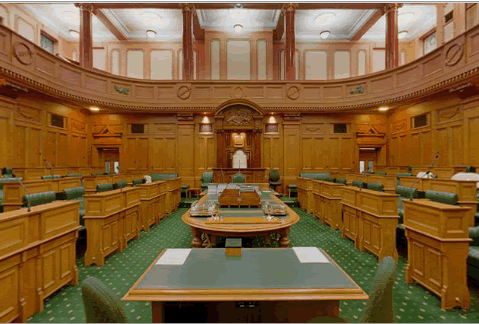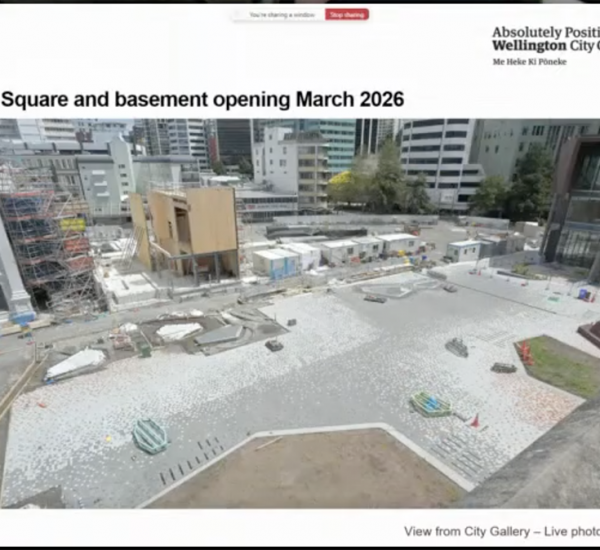At face value it could be argued that the current rash of urgency infecting Parliament at the moment is no business of a group promoting discussion of architecture and urban design issues in Wellington. Over the weekend the government passed laws reinforcing (rather than strengthening) societal repulsion of violence towards children. Last week it reduced the rights of employees of small businesses. Apparently on the urgency menu this week is overturning the previous parliament’s biofuels legislation. We’re getting closer now to urban issues at last I hear you say. But the issue is one of process which will affect the viability of all laws passed in such a frantic fashion, and it is a threat to our democratic process and our rights to participate. I’m thinking most particularly about the inevitable changes to the RMA, another National Party target. I’m not saying that the RMA doesn’t need changes. It’s a complex piece of legislation which constantly is in need of revision and reconsideration, but this behaviour is extraordinarily unacceptable and is not the way to make sound laws.
I listened to the farce of amendments to the Crimes Act on the radio on Saturday. The first reading was closely followed by the second reading, followed (breathlessly) by the third reading. What’s the point you have to ask? Conventionally there are select committees sitting in between each reading, the chance for experts and us public to voice opinions, and to let the politicians know about the repercussions of the laws proposed – but not just the laws – their phrasing, and potential legal interpretations are challenged and presumeably gone through with a fine tooth-comb (so to speak). This is not simply a process of ensuring that the law has some validity – but also that the intention of the lawmakers (and the country) will be effected by the careful crafting of legislation. If Cullen’s assertion that the Opposition didn’t even receive the Bill to be debated until Saturday are true, then we don’t even have the opportunity for alternative views to be adequately voiced under this new regime.
I have only heard pathetic excuses for this dictatorial behaviour. Something about the mandate given by the election – but it seems more likely that the exercise is really about literalising political slogans about 100 days. Regardless of the mandate, the significance of a well-crafted writing of law is the thing that ensures enduring and fair judgements. The disregard for this process instils fear (in this writer at least) about what f*-ups will occur around more complex legislation such as the RMA. It also demonstrates the costs this current government (not parliament) is willing to risk, in order to play at, rather than be, a government.
These actions make the accusations levelled at the Clark government of arrogance and speedily passed legislation (a.k.a. the Election Finance Act) appear surreal. Do we want good laws made to protect and promote good architecture and urban design, or are we happy with the superficial? Whatever our political persuasions, we must demand appropriate and democratic processes are followed in our law making. We must ensure that we are not cut out of the process and that the key role of select committees are valued and respected.





Oi, are you coming to the awards?
Name for the door……(you can send a “representative” if you like).
I note that the RMA amendment Bill is not being presented until February, and that the Govt. have set up an advisory group (and while I wouldn’t necessarily call the appointed group as completely independent, it does include at least 1 conservationist, and some who are very knowledgeable about the current act it seems…). Thus the bill isn’t being passed under ‘urgency’ (although still an urgent priority no doubt – being part of the first 100 days and all that)… It may be that Parliament sits under urgency again once the house reopens after the break – it wouldn’t surprise me…
Advisory panel details: http://www.scoop.co.nz/stories/PA0812/S00182.htm
I also suspect that such laws (those that were part of the 100 day promise) have been well-planned, prior to the election – given, in this case, Nationals previous links with our friends at the Centre for Resource Management Studies (and national’s initial policy direction release as early as 2005). The advisory group would therefore be commenting on the ramifications of the proposals and the wording with which they are expressed – functioning in some regards as a Select Committee, just with cunningly less democratic input.
Personally, I abhor the idea of bills being passed under urgency, without full scrutiny or democratic comment – urgency seriously needs redefining in terms of national emergency rather than political strategy… but afaict is simply another dodgy constitutional legacy of the previous administration…
Anyways, what would be more useful here (if you pardon my unsolicited editorializing) is some discussion on what changes we would like to see made – in terms of having a better outcome for the environment, especially the built environment. On the face of it National’s proposals are not very bold, and are the type of amendments many have called for anyway. I know there is a huge distrust that operates between socially minded urbanists and right wing government, but it would be useful to move beyond the emotional speculation and begin to deal in the facts of the case.
What is it that National propose that we don’t want? A faster, more efficient Process? An Environmental Protection Agency with more teeth than the current body? Another layer of bureaucracy designed to facilitate the hearing of complaints? …?
I’m just presenting the National spin here of course, but I have not yet come across a rational critique of it that has dismissed it as bad policy (and that includes existing govt environmental agencies e.g. MfE, DoC, etc – who have backed the general direction of the proposals)…
there was previously some discussion on that subject here:
http://eyeofthefish.org/resource-management-act-discuss/
definitely worth continuing here i think…
I think so too – only, the eyeofthefish page design doesn’t have a link to recent comments (which would facilitate the use of older discussion threads…
Anyway – I have posted a link to the policy paper over on the ‘RMA Discuss’ thread…
Well I guess National just have Labour beat when it comes to passing bills under urgency. Unless you count the one passed in September, about enforcing rest breaks and facilities for breastfeeding at work.
Now THAT was legislation that was needed urgently.
Partisan bickering aside, I think you are right.
The RMA does need changing, but it needs to be done through the correct process.
We need to work out a middle ground – neither namby-pamby and protectionist, nor greed-mongering and environment-destroying. At the moment, most parts are geared towards the former.
Kowhai – if I do manage to make it, will you make it worth my while? I need a large fish-bowl of course. Filled with exotic fruit punch, or seawater.
But seriously – not sure if i can make it. In the unlikely event of the Fish winning the nomination, hopefully Philip will be there to pick up the applause. The Maximus crew, of course, will have to remain virtual only, as well as virtuous.
Well OK, I agree with the general disquiet over the new government’s ridiculous law-passing session, but regards the RMA : this just somehow seemed wrong:
Fight on over wind farm
TANYA KATTERNS – The Dominion Post | Wednesday, 17 December 2008
A $500 million wind farm development near Dannevirke is opposed by many locals but is being backed by submissions received from as far as Britain.
Tararua District Council has received 400 submissions on Contact Energy’s resource consent application for the wind farm on the Puketoi Range, with about half opposing the application.
Contact Energy wants to build 65 wind turbines on the range above the Waitahora Valley, just 10 kilometres from where Mighty River Power is considering plans to build another 100 turbines.
More than 40 of the submissions in favour of the wind farm are from Britain and Australia, and many more, from Auckland, Taupo and elsewhere in New Zealand, back it because they favour renewable energy and clean power generation.
http://www.stuff.co.nz/dominionpost/4795105a6479.html
I mean – submissions from out of the country? Whether for or against – that just seems crazy talk. Yes, they’re probably Kiwis abroad, but really – should anyone outside NZ have a say?
I get the feeling that contrary to popular belief, NIMBY objectors aren’t always card-carrying Greenies. I wouldn’t be surprised if a lot of the NIMBYs are blue rinse fuddy-diddies who are actually suburbanists masquerading as environmentalists, with the real intent being the protection of their property values at any cost. For lack of a better description, I’d label them the “Quarter Acre Cartel”.
Anyone know how do they handle the functions of the RMA in some other countries? Perhaps there are better systems out there we can just borrow if the RMA is such a problem.
With regards to who can make submissions, the problem as I see it is that for some projects it only makes sense for local people to make a submission, for some others, they’re truely of national importance and everyone should get a say. Does the RMA have some way to distinguish between these?
And how is it that we can have dairy farms given permission to utterly destroy so many of our rivers, but you can’t build a damn power line over those farms to power a city of 1.3 million people?
Yeah it definitely needs some work.
erentz – re the functions of the RMA in other countries – I can only presume that our old system copied Britain’s system, but with the RMA we struck out on our own. If you check out rmastudies.org.nz you will find references to proposed changes by Owen McShane etc. An excerpt for you:
“A slim and simple plan is a sty in any Central Planner’s eye. Since 2002, Plans have been expanding their orbit at both ends of the scale. Regional Plans attempt to enforce “sustainable urban form.” Local Plans assert controls down to the colour and profile of the window joinery. Climate Change alarmists regulate our light bulbs and shower-heads.
“This is bad enough at the best of times – but we happen to be entering the worst of times. The National Party has already promised to make significant changes to the RMA, which will make any planning document obsolete – at least in part, and in some cases, a very large part indeed.
“It may be that the changes made in the first 100 days will focus on process rather than substance but if so, then the changes will have little effect on the investment climate in New Zealand.”
Note those words carefully: “The National Party has already promised to make significant changes to the RMA, which will make any planning document obsolete – at least in part, and in some cases, a very large part indeed.”
Some amendment to the RMA to speed up processes, and stop the disguised competition opposition would be good, but it should be done in a measured and consultative fashion.
Sweeping changes to make redundant large sections of District Plans ahould be very carefully considered, given that those Plans are themselves the result of long community debate, often court processes, and a large investment of time and money on behalf of many parties. To just dispense with Plan sections willy nilly would not represent a responsible approach to RMA change.
The Eden park plans are apparently already under huge pressure due to the RMA process not being fast enough; if anything this seems like it will add to the pressure to reform the thing.
Although interestingly, we are commonly cited as an exemplar of effective RM processes:
http://blog.longnow.org/2008/10/06/huey-johnson-green-planning-at-nation-scale/
Theres also an associated seminar podcast (1.5hrs long) as part of the SALT seminars (google/itunes it if your interested)
RE: urgency.
I’m not particularly impressed by either parties usage of urgency. One particular great example was back on ’06 when Labour used it to validate their illegal overspending at the prior election. However thats probably enough about politics…
RE: kowhai.
I’ll see if I can make it, depending on how non-virtual and non-virtuos I end up.
RE: M-D
The Fish may spontaneously evolve soonish, developing a second author that may actually author posts! Threaded comments! Readable line-lengths! Polls! Deliciousness!
Agree with the above comments on the need for balanced legislation. I suspect to throw out one problematic 3-letter acronym (RMA) would probably risk replacing it with another equally problematic one (ELF).
Philip – re your last comment – welcome back ! Glad to hear it !
I also share your sentiments. Watching the TV news on Tuesday, it showed the new Government settling into their comfortable green leather bench seats, and attempting to make their first few maiden speeches. Generally, it seemed, they kept making a bit of a botch-up of their words, not knowing quite who they were, how the protocols should work, etc. It is fair enough to expect that new Members and newly appointed Ministers may be wet behind the ears, and that they should be treading slowly in their first weeks in power.
However, that is not quite as it seems. For as you note, these said ministers have already passed several highly contentious areas into Law already, in the weekend, pushing them through without any cause for due process, and flouting completely the entire Parliamentary system that we have in place. No stops for breathing and thinking. No use of the Select Committee. And of course, we have no Upper House, no Senate, no second tier of more learned members who may force badly written legislation to go back to the house for a rethink and a rewording.
Not only does it make a mockery of our entire legal and parliamentary process, it surely must be bordering on being totally illegal, and unconstitutional as well. And certainly it should not be allowed to just happen without massive public uproar. That of course is where we fail in our society: like lambs to the slaughter, it appears that the New Zealand public once again neither understand nor care that their freedoms and rights and parliament are being abused by this monstrous act of disregard by Mr Key’s right wing fascist bully-boys.
Hastily written and ill-considered legislation is no friend to anyone. The shortcomings of Labour’s Electoral Finance Act were obvious for all to see – the ridiculousness of the situation where a jacket could be deemed to be a walking Party Political Broadcast and thereby needing a public notification of the parties home address for authorisation was rightly lampooned by the Act member Mr Hide, exposing it as a flawed and pointless piece of legislation, full of holes and ill-considered consequences.
Select Committees are not the answer to everything (and in the one case of a select committee that I followed, on the rewording of the Architect’s Act, they made a huge mess with needless and pointless and ill-considered meddling, which took months of work and lobbying to put right again), but at least they do provide a breathing space and an alternative view and the chance to consider consequences and wording and due process of parliamentary law.
It will not be long, I am sure also, until we find that National’s hasty (in all consequences, quite likely illegal) legislation will become a millstone around the necks of not just the right wing of our government, but around all our necks as well.
rondo – anything McShane has to say about anything should be taken with a truckload of salt (just read some of his essays). He might have the ear of certain factions of the National Party (or at least did in the Brash era), but I suspect that a more moderate Key would keep him somewhat at arms length…
In my view, the proposed changes (the 100 day lot) are fairly gentle, and seem on the face of it, quite positive (and based on pre-election policies – obviously developed some time ago). I have no doubt that they intend more far-reaching changes later on (and the policy paper indicates this – especially in relation to urban issues) but seeing as these are identified for work after indepth reviews, it would appear that they are being quite responsible. In my opinion, these will be the contentious pro-development changes, not the trifling changes that they are making in the current round.
Anyone, is welcome to disagree with this of course, but there seems to be a general resistance to discussing detail – it seems much easier to take a principled stand against a fearsome strawman…
M-D I’m not sure the fact the law changes are based on pre-elections policies is terribly relevant. One of the key issues is how the law is crafted and the need for open discussion about the draft Bill – from relevant experts, even if you think the election has given popular endorsement – though I’m not convinced that’s a straightforward conclusion.
lgm – I agree, and that obviously wasn’t the main point that I was trying to make… and I also agree about the contemporary trend in the use of urgency to pass important legislation…
there was previously some discussion on that subject here:
http://eyeofthefish.org/resource-management-act…
definitely worth continuing here i think…